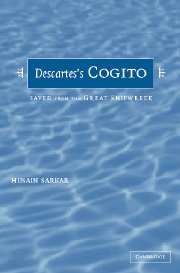Book contents
- Frontmatter
- Contents
- Preface
- Acknowledgments
- Abbreviations
- Descartes' Cogito
- 1 The Prolegomena to Any Future Epistemology
- 2 The Problem of Epistemology
- 3 The Solution: Cogito
- 4 A Skeptic against Reason
- 5 The Five Ways
- 6 Cogito: Not an Argument
- 7 The Content of the Cogito
- 8 Memory, Explanation, and Will
- Appendix A Comments on Jeffrey Tlumak's “Certainty and Cartesian Method”
- Appendix B Comments on Robert Nozick's “Fiction”
- Appendix C Cogito and the Port-Royal Logic
- Appendix D Bacon and Descartes
- Appendix E Comments on Anthony Kenny's “Descartes on the Will”
- Bibliography
- Name Index
- Subject Index
1 - The Prolegomena to Any Future Epistemology
Published online by Cambridge University Press: 01 September 2009
- Frontmatter
- Contents
- Preface
- Acknowledgments
- Abbreviations
- Descartes' Cogito
- 1 The Prolegomena to Any Future Epistemology
- 2 The Problem of Epistemology
- 3 The Solution: Cogito
- 4 A Skeptic against Reason
- 5 The Five Ways
- 6 Cogito: Not an Argument
- 7 The Content of the Cogito
- 8 Memory, Explanation, and Will
- Appendix A Comments on Jeffrey Tlumak's “Certainty and Cartesian Method”
- Appendix B Comments on Robert Nozick's “Fiction”
- Appendix C Cogito and the Port-Royal Logic
- Appendix D Bacon and Descartes
- Appendix E Comments on Anthony Kenny's “Descartes on the Will”
- Bibliography
- Name Index
- Subject Index
Summary
In 1628, Rene Descartes received an invitation to a meeting at the home of Cardinal Bagni, papal nuncio. Descartes brought with him Father Mersenne, a Minim friar, and M. de Ville-Bressieu, a physician of Grenoble. This was no ordinary meeting. It consisted of well-known honnets gens of Paris. They had met to hear a famous doctor-chemist by the name of Chandoux. Chandoux was an expert on base metals who three years later was to be executed for peddling fake currency. Chandoux, charming and fluent, was denouncing the verbiage of scholastic philosophy as it was usually taught in the Schools. There was little new in what he said, for it was mostly in the vein of Francis Bacon, Pierre Gassendi, and Thomas Hobbes. Yet he wanted his system of philosophy to appear fresh and novel. Whatever Chandoux said, everyone applauded. That is, everyone save Descartes.
The founder of the oratory, and perhaps the most powerful religious thinker of the Counter-Reformation, Cardinal Berulle, observed this. He asked Descartes what he thought of Chandoux's speech that had so thrilled the audience. Descartes demurred, saying “that he could not speak in opposition to the feeling of the savants present.” But the Cardinal did not relent. At last, Descartes spoke. He began by praising Chandoux's denunciation of scholastic philosophy. But then he argued against the speaker and “that great and learned company” for taking probability as the central notion and not the notion of truth.
- Type
- Chapter
- Information
- Descartes' CogitoSaved from the Great Shipwreck, pp. 1 - 32Publisher: Cambridge University PressPrint publication year: 2003



